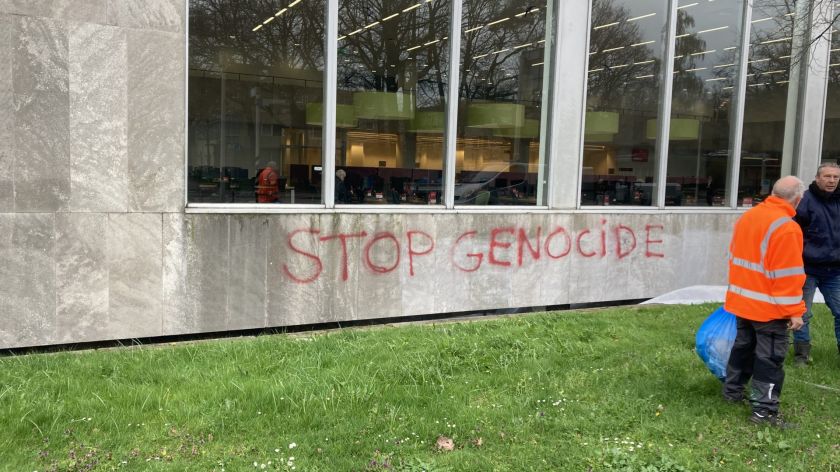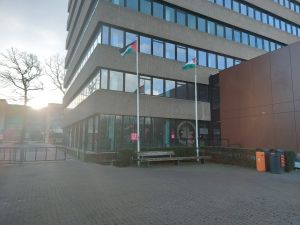Radboud University will not sever ties with Israel due to wartime violence.
-
 Graffiti op de UB. Foto: Vox
Graffiti op de UB. Foto: Vox
The cooperation agreements between two Israeli universities and Radboud University will continue to exist. In a letter to Scholars for Palestine, an activist group calling for a boycott, the Executive Board writes that they are cautious about severing ties. However, the university does want to provide support to Palestinians.
It was made clear once again last weekend that tensions over the war in Gaza are running high, even in Nijmegen. Prior to the university’s open day, unknown activists raised two Palestinian flags in Erasmus Square, and the University Library was defaced with slogans such as “Boycott Israel” and “Free Palestine.” Visitors to the campus found new graffiti on the library building this morning as well.
Scientists and students at Radboud University have been active for some time, including with demonstrations, a petition, and a series of lectures.

Additionally, an email was sent out in January from the Scholars for Palestine collective, in which the authors made four demands of Radboud University. The most important: suspend ties with Israeli universities and companies. Additionally, the activist group wants the university to allocate funds for the reconstruction of Palestinian higher education and for scholarships for Palestinian students and researchers.
Cautious
Last week, Scholars for Palestine received a response from the Executive Board. In that letter, shared with Vox, the administrators wrote that they are deeply concerned about the armed conflict in Israel and the Palestinian territories. They speak out against human rights violations and in favor of stopping violence against innocent civilians.
However, the Executive Board is “cautious” in “limiting (institutional and individual) collaborations.” According to the administrators, collaboration can be seen as an opportunity to maintain an “open line” even in times of conflict.
Regarding support for Gaza, the board writes that it will examine what contribution the university can make to rebuilding the scientific infrastructure in the area. “This can, for example, be in contact with existing academic relationships.”
Additionally, Radboud University, along with other universities in The Hague, will advocate for support for Palestinian areas and lower tuition fees for Palestinian students.
Disappointed
Overall, Harry Pettit, lecturer in social geography and one of the members of Scholars for Palestine, is disappointed with the board’s response. He sees progress in terms of support for Palestinians but continues to call for the suspension of ties with Israeli institutions.
Pettit primarily targets Tel Aviv University and Hebrew University of Jerusalem, with which Radboud University has collaborative agreements. According to Pettit, there are sufficient reasons not to want to be associated with these institutions. ‘The university in Tel Aviv develops weapon systems that are currently being used on the battlefield in Gaza. And at Hebrew University, academic freedom is under such pressure that a professor has been suspended for speaking out against the war.’
‘People are literally starving because Israel won’t allow aid’
Pettit has no evidence that Radboud University is using the ‘open line’ with these institutions to express its disapproval of the violence. ‘If you use this as an argument not to suspend ties, you must also do something with it.’
According to Pettit, the response of Dutch universities sharply contrasts with the response to the Russian invasion of Ukraine. At that time, Dutch universities were requested by the ministry to freeze ties with Russian institutions. ‘The fact that this directive does not come from The Hague now is a poor excuse for not taking moral responsibility.’
‘Just look at what’s happening in Gaza now,’ Pettit continues. ‘People are literally starving because Israel won’t allow aid. What else is needed before the university takes action?’
Translated by Siri Joustra



